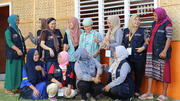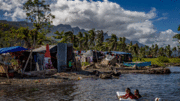-
Country Pages
-
Asia & the Pacific
- Afghanistan
- Bangladesh
- Bhutan
- Cambodia
- China
- India
- Indonesia
- Iran, Islamic Republic of
- Lao People's Democratic Republic
- Malaysia
- Maldives
- Mongolia
- Myanmar
- Nepal
- Pakistan
- Papua New Guinea
- Philippines
- Sri Lanka
- Thailand
- Timor-Leste
- Viet Nam
-
Eastern Europe & Central Asia
- Albania
- Armenia
- Azerbaijan
- Belarus
- Bosnia and Herzegovina
- Georgia
- Kazakhstan
- Kosovo Office
- Kyrgyzstan
- Moldova, Republic of
- North Macedonia
- Serbia
- Tajikistan
- Türkiye
- Turkmenistan
- Ukraine
- Uzbekistan
-
Arab States
- Algeria
- Djibouti
- Egypt
- Iraq
- Jordan
- Lebanon
- Libya
- Morocco
- Oman
- Palestine
- Somalia
- Sudan
- Syrian Arab Republic
- Tunisia
- Yemen
-
East & Southern Africa
- Angola
- Botswana
- Burundi
- Comoros
- Congo, the Democratic Republic of the
- Eritrea
- Eswatini
- Ethiopia
- Kenya
- Lesotho
- Madagascar
- Malawi
- Mauritius
- Mozambique
- Namibia
- Rwanda
- Seychelles
- South Africa
- South Sudan
- Tanzania, United Republic of
- Uganda
- Zambia
- Zimbabwe
-
Latin America & the Caribbean
- Argentina
- Bolivia, Plurinational State of
- Brazil
- Chile
- Colombia
- Costa Rica
- Cuba
- Dominican Republic
- Ecuador
- El Salvador
- Guatemala
- Haiti
- Honduras
- Mexico
- Nicaragua
- Panama
- Paraguay
- Peru
- Uruguay
- Venezuela, Bolivarian Republic of
- Caribbean (multi-country)
-
West & Central Africa
- Benin
- Burkina Faso
- Cabo Verde
- Cameroon
- Central African Republic
- Chad
- Congo
- Côte d'Ivoire
- Equatorial Guinea
- Gabon
- Gambia
- Ghana
- Guinea
- Guinea-Bissau
- Liberia
- Mali
- Mauritania
- Niger
- Nigeria
- Sao Tome and Principe
- Senegal
- Sierra Leone
- Togo
-

UNFPA Philippines
Active in the Philippines since 1970, UNFPA backs national objectives to achieve universal access to sexual and reproductive health care, and reduce maternal deaths. Though maternal mortality is slowly decreasing, the unmet need for family planning has edged up. In disadvantaged areas, UNFPA supports health systems to deliver core services to women and their newborn infants, young people, and men. It partners with government agencies on using effective data to guide policy-making, and civil society organizations to advocate for reproductive rights.
Population
- Population aged 0-14
- Population aged 15-64
- Population aged 65+
Sexual and reproductive health
- Births attended by skilled health personnel
- Births not attended by skilled health personnel
Family Planning
- Modern method
Education
Gender, Rights, and Human Capital
Harmful Practices
Population Pyramid
Life Expectancy
Total fertility rate
News
Smoothing rough roads to reproductive health services in the Philippines
GUINDULUNGAN, The Philippines – For many members of the indigenous Teduray tribe residing in the southern Philippines,…
Hope on wheels: Emergency maternal health units reach farthest corners of the Philippines
Typhoon Rai demolished hundreds of thousands homes across the Philippines, splintering trees and forcing residents to…


Social Updates
Tweets from UNFPATürkiye